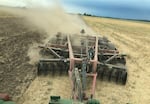
This tiller on Hunton's seed farm will drive precisely straight without any hands on the steering wheel. The newest equipment does even more, but may require specialists to fix the computerized systems.
Karen Richards / KLCC
Oregon’s farm production depends on field workers to tend and harvest the crops. New technology could affect farmworkers for better or worse.
Farm owners sometimes cite technology as a way to cut jobs. Ira Cuello Martinez is with Oregon’s farmworkers union, PCUN. He said, “We heard public testimonies from the ag industry around, if we’re forced to pay overtime then I’m going to look into mechanization or automation of my equipment.”
Cuello Martinez doesn’t worry about jobs going away, though. He said many specialty skills can’t be replaced.
At King Estate Winery in Eugene, Raymond Nuclo said technology can keep people from working in extreme conditions. “It’s not easy to work eight, nine hours a day out in the vineyard,” said Nuclo, “so we have definitely been moving to more mechanization. So jobs that previously would have been done by hand we now do by an air-conditional cabbed tractor.”
Nuclo said better equipment will also help the vineyard if there are labor shortages.
Gary Maxwell and Bruce Linquist, mechanics at Hunton’s seed farm in Junction City, Oregon, said even tractor drivers may be out of a job soon. “I think what’s coming is operator-less equipment, I mean they’ll do it all, by themselves,” said Maxwell. Linquist added, “Eventually it will get to the point where you just have to program the computer, and there’ll be enough sensors, you have to have sensors on everything, in order to detect the problems.”
The two laugh and say they won’t lose any work: There are always mechanical problems on a farm.

Gabriel Ledger, left, and Yu Matsumoto, middle, assess Danny Wheeler's ankle at the Farm Clinic.
Melorie Begay / KLCC
Recent heat waves and wildfire smoke have added new health challenges for the people who work on Oregon’s farms. Doctor Gabriel Ledger started an outreach clinic for farmworkers in Benton County nine years ago.
He said their volunteers usually treat issues like joint and muscle pain from physical labor. During wildfire season, though, “We have a decent number of patients at our farm clinic who have allergies already,” he said, “and who either suffer from asthma or some asthma-like issue where they have some wheezing from time to time. Certainly that gets worse during the bad smoke that we had last year, and I’m worried that that might happen again.”
Ledger said farmworkers are largely uninsured or underinsured, and he wishes more had access to the Oregon Health Plan. He’d also like to see more farm clinics, which can bring care to workers. His program will add sites in Albany and Philomath soon.